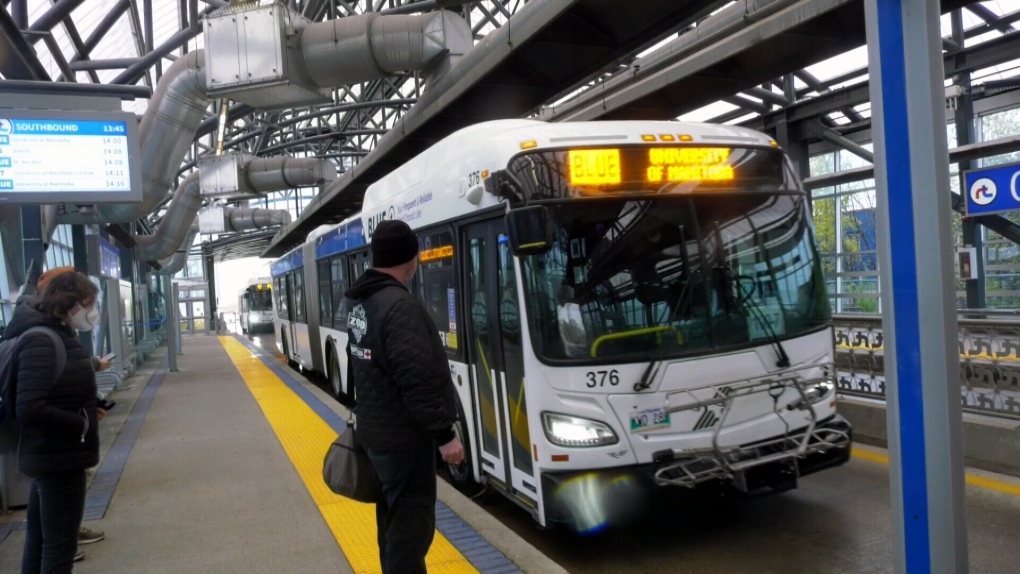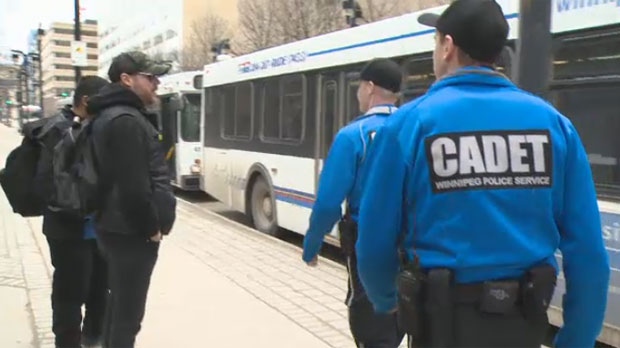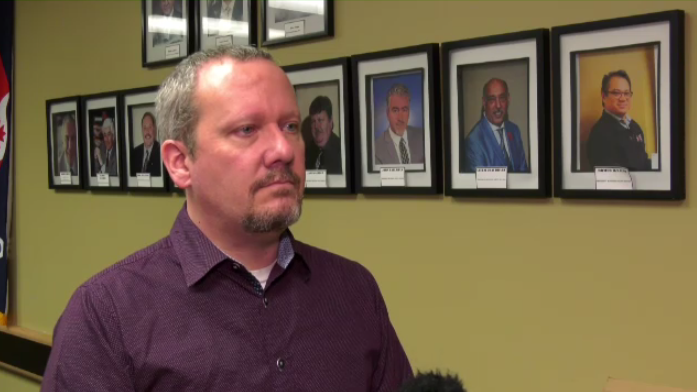'The public wants reassurance': ideas floated for Winnipeg transit safety

An expert in policing thinks the Winnipeg Police Service (WPS) should use its cadets to keep transit routes safe, but the service says patrolling buses would be too dangerous for them.
Meanwhile, Winnipeg Transit continues to look for security solutions after a rash of recent transit-related incidents.
Curt Griffiths is a professor in the School of Criminology at Simon Fraser University (SFU) and coordinator of its Police Studies program. Before the pandemic, Griffiths was part of a review of Vancouver's transit police.
"It is the only standalone armed transit police service in Canada," he said. "Most transit police are integrated into the municipal police service, NYPD has a transit division," said Griffiths.
He said in Vancouver, transit police have the same training as regular police, "The officers are armed. They're trained at the Justice Institute of British Columbia, along with municipal police recruits."
Griffiths' operational review of the Vancouver Transit Police found several issues, including the recruitment and retention of officers.
"Often times, it was being used as a lily pad for officers who had been deferred either by the RCMP or the municipal police services in British Columbia," he said.
Griffiths said Winnipeg doesn't necessarily need its own standalone transit police, as it would be expensive and unwieldy, but there are lessons we can learn from the review.
The issue of safety on Winnipeg Transit buses has come to the forefront after several violent incidents over the last month. On Dec. 29, a man was attacked with a machete on a bus in St. Vital. On Jan. 20, a father and his 10-year-old son were attacked by two people on a bus on Main Street. Four days later, an 18-year-old was attacked while transferring buses in South Winnipeg.
Griffiths has been called upon to review the operations of several Canadian police departments, including the WPS more than a decade ago. He said Winnipeg already has the solution to its transit safety problems.
"My recommendation would be juice up the cadets," he said, adding that police cadets already have a lot of the training and responsibility needed to patrol buses. "They do have the power to enforce provincial and municipal by-laws and regulations," said Griffiths.
Griffiths said the cadets' training makes them well-suited to dealing with the trouble happening on Winnipeg's buses. "De-escalation, trauma, informed interactions, interacting with people who are experiencing trauma," he said.
He said cadets can call in WPS officers when needed. "They're already part of the WPS, so you've got that interoperability. The officers and the cadets worked really well together when we were there. And I don't assume that's changed."
The WPS said in an email to CTV News that having cadets patrol Winnipeg Transit buses is not on their radar.
"The reality is that members of the Auxiliary Cadet Unit are employed as civilians with a lower level of training, equipment, tools, and powers of arrest afforded a sworn member," the email said. "As civilian members of the Winnipeg Police Service, Cadet members cannot be placed in a position where their safety is jeopardized, including patrolling enclosed places such as Transit buses and parkades, for example."
Griffiths said it's not just about stopping violence; people want to feel safe when they ride the bus.
"The public wants reassurance," he said. "They want visibility. Having a person who is in uniform of whatever sort (can help). I know that the cadets at that time we were there were wearing windbreakers, but it was clear that they were associated with the police, (which) can serve as a deterrent."
 Griffiths said the cadets' training makes them well-suited to dealing with the trouble happening on Winnipeg's buses. (File photo)
Griffiths said the cadets' training makes them well-suited to dealing with the trouble happening on Winnipeg's buses. (File photo)
Griffths said the recent violence is a symptom of a larger problem.
"Community residents feel unsafe, not necessarily because of crime, but disorder," said Griffiths. "The unpredictability of somebody who's riding on a bus or standing on a street corner who is talking out loud, talking to themselves and behaving unpredictably … we find in our community studies that is as disconcerting to people as actual crime."
Griffiths said the cadets can track past incidents and patrol buses accordingly.
"They already know what the high-trouble bus routes are. It's generally not in certain areas and often in others at certain times of the day. So they can do their analytics. They can target. And you can also not only target bus routes, but also the individuals," Griffiths said.
Winnipeg Transit said in an email to CTV News it is always looking at ways to improve safety.
"The Transit Advisory Committee (TAC) provides guidance for all potential new safety initiatives. It is made up of representatives from council, Transit leadership, the Amalgamated Transit Union (ATU), the Winnipeg Committee for Safety, the Winnipeg Association of Public Service Officers (WAPSO), the City of Winnipeg’s Indigenous Relations Division, the Winnipeg Police Service (WPS), and Transit operators," the email said. "The TAC is currently exploring strategies and options for a long-term security/safety plan for Winnipeg Transit."
The WPS said it has not been provided with any new initiatives regarding safety strategies at this time.
Violence on public transportation has become a concern across Canada, with the ATU calling for the formation of a national task force to address the issue.
"We need to take affirmative action to get these matters resolved. Safety has grown exponentially as a primary concern for both my members and the riding public," said Chris Scott, President Business Agent for ATU local 1505 in Winnipeg.
 ATU Winnipeg president Chris Scott said he hopes to see representatives from all Canadian transit agencies on a national task force about transit safety. (Source: Jamie Dowsett, CTV News)
ATU Winnipeg president Chris Scott said he hopes to see representatives from all Canadian transit agencies on a national task force about transit safety. (Source: Jamie Dowsett, CTV News)
"We've had reports of escalating incidents in both Toronto and Edmonton," he said. "These people are getting on, empowered that they don't have to follow the rules, ride for free, and it just escalates from there."
Scott said he hopes to see representatives from all Canadian transit agencies on the task force, as well as union representatives and members of the Canadian Urban Transit Association.
"I would like to see testimonials from either operators or passengers on what they've experienced," he added.
He'd also like to hear more national dialogue around the issue, "We have a lot of good communication locally right now, but perhaps there are ideas coming from other places in Canada."
Griffiths maintains the Winnipeg police cadets are up to the task. "It's familiarity. Your cadets already know persons who are vulnerable, marginal. They've tried to help them, refer them to services," he said.
"I would build on the foundation you already have."
CTVNews.ca Top Stories

Canadian team told Trump's tariffs unavoidable right now, but solutions on the table in surprise Mar-a-Lago meeting
During a surprise dinner at Mar-a-Lago, representatives of the federal government were told U.S. tariffs from the incoming Donald Trump administration cannot be avoided in the immediate term, two government sources tell CTV News.
Pedestrian killed by Via Rail train near Kingston, Ont.
Regular rail traffic has resumed with severe delays.
Muskoka reacts to major snowfall, hundreds stuck on Highway 11
From road closures, power outages, weather declarations and nonstop shovelling, Muskoka residents were faced with nearly a metre of persistent snowfall on Saturday.
Saskatoon priest accused of sexual assault says he meant to encourage young girl with hug and kiss
A Saskatoon priest accused of sexual assault says he meant to encourage and reassure a young girl when he hugged and kissed during his testimony at Saskatoon Provincial Court Friday.
Beef prices reach record highs in Canada
The cost of beef continues to rise, reaching record highs on grocery store shelves ahead of the busiest time for many grocers and butchers before the holiday season.
Trump threatens 100% tariff on the BRIC bloc of nations if they act to undermine U.S. dollar
U.S. president-elect Donald Trump on Saturday threatened 100 per cent tariffs against a bloc of nine nations if they act to undermine the U.S. dollar.
Bob Bryar, drummer for rock band My Chemical Romance, dead at 44
Bob Bryar, former drummer for the band My Chemical Romance, has died. He was reportedly 44.
Toronto man accused of posing as surgeon, giving four women injections
A 29-year-old Toronto man has been charged after allegedly posing as a surgeon and providing cosmetic procedures on several women.
'Disappointing': Toronto speed camera cut down less than 24 hours after being reinstalled
A Toronto speed camera notorious for issuing tens of thousands of tickets to drivers has been cut down again less than 24 hours after it was reinstalled.


































